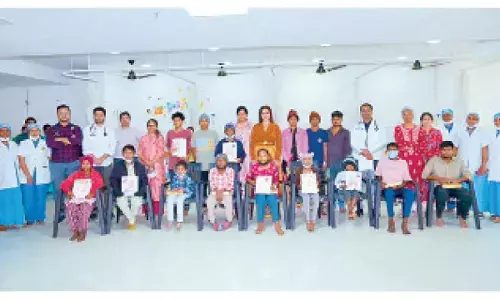Tips and tricks to stimulate brain activity in children
 Tips and tricks to stimulate brain activity in children
Tips and tricks to stimulate brain activity in childrenPre-schoolers like to indulge in activities including reading, structuring, simple arts, exposure to languages and music. They benefit by consistency in disciplining and by being given choices in simple tasks like what to play, wear, and eat
The human brain is arguably the most complex biological system with a highly dynamic lifespan and encompasses continuity and changes at both structural and functional levels. Especially during the childhood, it's crucial to stimulate the growing brain and keep it well-exposed to positive stimuli.
"There is rapid brain growth in the initial two years of life that extends until eight years of age. This is accompanied by a slow rate of functional maturation that extends into early adulthood. The initial years form the basis for future learning, emotional wellbeing and contributes substantially to health and life success. Nurturing and responsive care forms a keystone in supporting and stimulating brain development," Dr Kavita Gohil, Paediatrician, Zen Multispeciality Hospital, Chembur told..
Children are dependent on parents and caregivers to provide them the necessary tools to enhance their development and aid them in developing the right skills which are necessary throughout one's lifespan. They grow and learn best in a safe environment that is relatively free of neglect and stress. Children need opportunities to explore and satisfy their inquisitiveness and, in the process, enhance their own abilities at being independent.
As per Dr Kavita, parents can and should play a crucial role to ensure regular brain activity and provide different means of stimulation even while going through a regular and monotonous work routine.
What parents can do? Speaking, playing, caring encouraging unstructured free play, exposure to books, stories, songs helps strengthen all areas of development including language skills and communication. In babies, it is essential that they develop bonds of love and trust as a part of their social and emotional development.
Different activities that can help with developmental process may vary as per the age and the temperament of the child. Infants would thrive by inculcating simple things like talking, reading, singing playing music, cuddling. Toddlers benefit by encouraging independence, responding positively to wanted behaviours and encouraging curiosity.
Pre-schoolers would like to indulge in activities that may include reading, structuring, simple arts, exposure to languages, and music. They also benefit by consistency in disciplining and by being given choices in simple tasks like what to play, wear, and eat.
Older children are more independent, think about the future and also are more affected by friendships, team work etc. They also show rapid development of mental skills and are better in describing their thoughts and feelings. This age group would thrive with being given a sense of responsibility like helping with household tasks.
The four main areas of development are motor (physical), language and communication, social and emotional and cognition (describes how a child's intellect grows and includes thinking, learning, problem solving skills which in turn affect all other areas of development).
Daily activities that go a long way in overall stimulation and development are:
l Ensure health, safety and good nutrition.
l Develop a warm and caring relationship.
l Recognise that each child is unique.
l Talk, read and sing.
l Encourage self-exploration and play.
l Use discipline and consistency to teach and help establish a routine.
l Become involved. Provide comfort, contact.
l Encourage good sleep routine.
l Regular physical activity affects attention, thinking, language learning and memory. Even a 12-minute session of aerobic exercise improves selective attention of children.
l Executive functioning like ability to manage time can be enhanced with proper guidance and help. This can be done via short workouts, breathing exercises, short lists to remember, list of toys and recollection.
l Board games improve attention, concentration, coordination and frustration tolerance.
l Communication is a lost art. Daily talk time involving sharing one's own day to day experiences and keenness to know their daily challenges help in improving communication skills and conversational skills.
l Sharing thoughts, feelings help build relationships, reduce stress and provide coping and problem-solving skills without being imposing. Family dinner time is an opportune time for enhancing these activities.
l Create stimulating environments like decoration, art work, provide areas and experiences at home, play area, book area, art area, music area, nature area etc.
l Engaging in sports, playing a musical instrument, physical activity is associated with high levels of motivation, ability to set goals and self-control and aid efficient cognitive function especially in preadolescents.
l Help teenagers find new creative and expression outlets like watching sports, music, writing and other art forms.
l Encouraging socialising, encourage their friends to visit home and be available.
l Limit screen time based on the age group.











